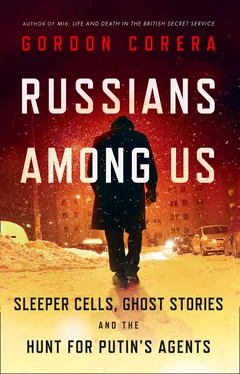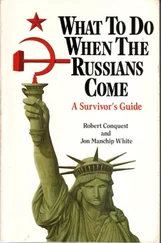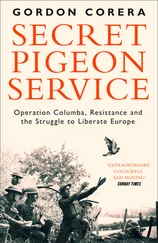The young couple was approached by a man who had an unusual proposal. Did they want to serve their country? She was only twenty-one. “I wondered what would happen to our relationship,” Vavilova thought. “I believe we were selected separately, each of us could have refused the proposal,” Vavilova later explained to me. “However, since we were already romantically involved, it was more beneficial to have us as a couple for the training.” She would later reflect that love marriages among illegals were better than arranged ones because of the trust that was always there. Their first curator sat down with them and in long conversations began to see if they were suitable—their recruiter talked to them about their backgrounds, their lives, their friendships, and their studies, carefully probing them to make sure they had what it took. The strains of the life they were to live drove others apart but, in their case, it would bring them even closer together.
Why did Elena Vavilova agree to become a spy? “The concept of the Motherland—an amalgamation of everything that is important to you,” was her explanation later. Vavilova and Bezrukov were still living in the era of communism when they were approached by the KGB, but it was always as much defending Mother Russia as spreading communism that had motivated them. “For me the main motive that made me agree and accept this job was the desire to prevent another terrible war, like the Great Patriotic War,” Vavilova later said, using the Russian name for World War II. “As a teenager, all the films about the war and the suffering the people had to go through and the high price we had to pay for victory, all of this fostered in me a wish to be part of whatever could be done to prevent it from happening again.” This was the driving force for many Russian spies from the Cold War generation—the sense of threat to their country and the story of their near defeat at the hands of the Nazis before a victory that came at an enormous cost (one which many feel is rarely acknowledged in the West). Almost every family had lost someone in that brutal war. The illegals’ mission was to prevent it happening again by acting as a warning system. The early eighties, when the couple was approached, were years when the need for such warning seemed all too real. In Washington, there was an American president calling the Soviet Union “the evil empire” and who, Moscow feared, might be gearing up for confrontation and perhaps even a first nuclear strike. And at the same time, young men from the Soviet Union, including fellow students from Tomsk, were heading off to fight in a brutal conflict in Afghanistan.
In the West, the word spy refers to both heroes—the James Bonds—and villains—traitors like the Kim Philbys. But in Russia they separate the two concepts with different words—a spy is a betrayer of secrets. Meanwhile, their word for heroic intelligence officers translates more closely in English to “scouts”—in the sense of someone who is working behind enemy lines to scout ahead and report back, providing advance warning. The separating of the two ideas makes it easier in Russia to lionize the heroes and demonize the villains. It also explains how the illegals saw themselves as operating behind enemy lines in order to protect the motherland. They were the “soldiers of the invisible front.”
Soon after, the couple was married. Bezrukov’s parents came to the modest reception in Elena’s parents’ house. A few years later they would be married for a second time, this time as Donald Heathfield and Ann Foley (she chose to use her new middle name rather than Tracey). “The gap between our weddings was short, a few years, but those years were very intense,” Vavilova later explained. There was no honeymoon the first time. Instead, Bezrukov and Vavilova simply vanished from the life of friends and family as they headed to Moscow. Despite the excitement of being in the nation’s capital and the luxury of a two-bedroom apartment, this period was challenging. “The years before we left were quite taxing physically, psychologically and intellectually,” she would say. By the end of every week, they would be exhausted. They had to learn all the traditional “tradecraft” involved in being a spy—out on the Moscow streets they practiced brush-pass contacts, where one person hands over items to another surreptitiously—and tested on whether they could spot surveillance. Inside, they learned martial arts, how to shoot a gun, and how to evade a polygraph lie-detector test. But there was much more to the creation of an illegal than attending regular spy school. For a start, the training was provided to them as a couple by a small group of tutors. They did not mix with other recruits to protect their identity. But it also involved going much deeper. Each illegal required a staggering investment—around four years and by some estimates a million dollars. This compares to CIA and MI6 training for new officers, which is measured in months, not years. “It was not a mass production,” one head of the KGB said. “You do not train illegals … in the classes. It’s a piecemeal operation. You work with an individual, one on one. And only in such a way, we can make them look like an Englishman or a Spaniard or a German.”
As the Moscow snows came and went, Bezrukov and Vavilova’s education involved former illegals educating them in the history of the elite spies whose ranks they were to join. Moscow had developed its specialty in illegals after the 1917 revolution. Many countries did not have diplomatic relations with the communist Soviet Union so diplomatic cover was not an option. In those early years, there had also been a pool of ideologically committed communists of various nationalities who were willing to spy for Moscow. This led to the heyday of the illegals in the 1930s and 1940s. Richard Sorge operated undercover in Japan, moving in the highest diplomatic circles to provide vital intelligence about Tokyo’s relationship with Nazi Germany. In Europe, illegals recruited people who were students and some would slowly work their way into positions of power and influence. Some, like Kim Philby and the Cambridge spies in the United Kingdom, would reach the highest echelons of Western intelligence agencies. In America, illegals worked with the atomic spies who stole the most sensitive secrets imaginable, which proved vital in allowing the Soviet Union to avoid defeat in the early Cold War. Many of these early international illegals were rewarded with execution in Stalin’s purges.
In the mid-1950s, the KGB began a push for a new generation of homegrown illegals. They never quite matched their predecessors, although there were some successes. Among the best known was Konon Molody, who turned into Canadian Gordon Lonsdale. He came to London and ran a spy ring stealing naval secrets. Molody had previously worked as an understudy in the United States for another of the great illegals—Rudolf Abel, a remarkably talented individual who had been born in Britain and served in World War II on the front lines before embedding himself in New York. These were the footsteps Bezrukov and Vavilova were to follow in.
The illegals were treated as heroes in the Soviet Union, far more than their spy counterparts in the United States or Britain. There were stories of their daring undercover operations in World War II. The most fabled was Nikolai Kuznetsov. Films and books were based on his time posing as a member of the German occupying army in Ukraine during which he killed six senior Nazis. The accounts of World War II illegals were a central part of Soviet popular culture promoted by the KGB. One fictional work was turned into a 1973 TV series called Seventeen Moments of Spring. It featured a deep-cover illegal, a Soviet version of James Bond, who posed as a German aristocrat to infiltrate the Nazi SS and who prevented the Nazis from negotiating a peace deal with America. The series was a massive hit, reaching up to 80 million viewers, and was constantly repeated, embedding itself in the popular mind. Vladimir Putin was twenty-one when the series was first shown and he became desperate to sign up for the KGB. One of his first jobs in East Germany in the 1980s, he would later boast, was to work with illegals.
Читать дальше












